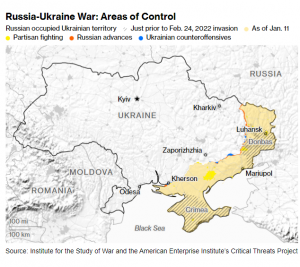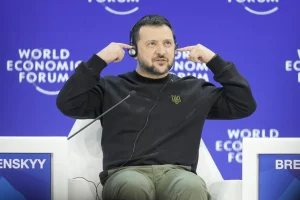
EDITORS NOTE: Graphic content / This photograph taken on January 21, 2024 shows bodies of people, killed as a result of a missile strike, lying on the ground in Donetsk, amid the ongoing Russian-Ukrainian conflict. At least 25 people were killed and 20 injured in shelling on a market in the Russian-controlled city of Donetsk in east Ukraine, the region’s Moscow-installed chief Denis Pushilin said on January 21, 2024.
Published January 21, 2024
The shelling of a market in a part of Russian-occupied Ukraine killed at least 25 people on Sunday, The Associated Press reported.
Denis Pushilin, head of the Russian-installed authorities in the city of Donetsk, said another 20 people, including two children, were wounded in the strike on the outskirts of the city, the AP reported. He claimed shells were fired by the Ukrainian military.
Pushilin claimed the area was hit with a 155 mm caliber and 152 mm caliber artillery, with shells being fired from the direction of Ukrainian cities Kurakhove and Krasnohorivka, per the news wire.
Kyiv did not comment on the event and the claims could not be independently verified, the news wire noted.
The Russian Foreign Ministry, in a translated statement, called the incident a “barbaric terrorist act against the civilian population of Russia.”
READ FULL ARTICLE
SOURCE: www.thehill.com
RELATED: Ukraine’s Desperate Hour: The World Needs a Russian Defeat
After one year of war, it looked like Putin was going to lead a weakened, humbled nation. Entering year three, he has a chance to break Western solidarity.

Published January 18, 2024
This is part two of a three-part series on the past, present and future of the war in Ukraine. Part one explores whether a different US strategy could have put Ukraine in a stronger position than it holds today. Part two examines the lessons and global impacts of the war. Part three analyzes how US and Ukrainian strategy will unfold in 2024 and after.
Since Russian President Vladimir Putin’s forces invaded Ukraine in February 2022, Western analysts have tried to discern what that conflict means for the wider world. In the hopeful early months of the war — characterized by Ukrainian resilience, Russian incompetence and Western unity — it often seemed that the conflict was revealing the strength of the free world and the debility of its enemies.
Nearly two years later, a stalemated struggle is threatening to leave an altogether darker legacy.
The US intelligence community — with its astute effort to publicly release large amounts of unclassified data in early 2022 — may have robbed Putin of surprise in attacking Ukraine, but his invasion was still plenty shocking. European observers spoke of a “1939 moment” — a case of unprovoked, large-scale aggression that threatened to rupture the global order. But a combination of desperate Ukrainian resistance, inadequate Russian preparation and emergency assistance from the West helped thwart this authoritarian onslaught.
The US and its allies heaped sanctions on Putin’s economy; their aid helped Ukrainians kill droves of Russian invaders. The democratic world found new purpose, with the North Atlantic Treaty Organization expanding and countries from Western Europe to East Asia recommitting to the collective defense.
US President Joe Biden declared that the West’s response had been “unprecedented and overwhelming.” As Western countries froze Russia’s foreign exchange reserves and punished its high-tech industries, Biden bragged that sanctions were “devastating” Putin’s economy. His administration was soon arguing that Russia had already suffered a “strategic defeat” in Ukraine — that it would emerge from the war crippled militarily and economically.
Russia-Ukraine War: Areas of Control

In 2022, with Putin’s army flailing and Ukraine’s friends rallying, it appeared that a brutal invasion would fortify an American-led global order. In early 2024, Putin’s forces are entrenched, Ukraine’s prospects are uncertain, and the war could still become a setback, not a victory, for the democratic world.
Western sanctions no longer look like wonder weapons. The Russian economy contracted by just 2.2 percent in 2022, and resumed growing in 2023. Russian trade has been rerouted to Asia; financial, technological and commercial relations with China are flourishing. Geopolitically ambivalent swing states, such as Turkey and the United Arab Emirates, are helping Moscow mitigate its economic isolation. Granted, the costs of conflict have exacerbated economic imbalances in Russia. But there is no near-term prospect of the economy, or the war machine it supports, falling apart.
Nor is it clear that the West will soon face a weakened, humbled Russia, incapable of seriously menacing its neighbors. Sure, Putin’s country has suffered grievous losses of men and materiel. But the government has mobilized hundreds of thousands of new soldiers and put the economy on a war footing. With the Kremlin pouring money into the defense sector, military production is soaring: Russia will pump out more artillery shells in 2024 than the US and Europe combined.
READ FULL ARTICLE
SOURCE: www.bloomberg.com
RELATED: Nearly two years after invasion, West still seeking a way to steer frozen Russian assets to Ukraine

Published January 18, 2024
WASHINGTON (AP) — It’s been nearly two years since the United States and its allies froze hundreds of billions of dollars in Russian foreign holdings in retaliation for Moscow’s invasion of Ukraine. That roughly $300 billion in Russian Central Bank money has been sitting untapped as the war grinds on, while officials from multiple countries have debated the legality of sending the money to Ukraine.
The idea of using Russia’s frozen assets is gaining new traction lately as continued allied funding for Ukraine becomes more uncertain and the U.S. Congress is in a stalemate over providing more support. But there are tradeoffs since the weaponization of global finance could harm the U.S. dollar’s standing as the world’s dominant currency.
At this week’s World Economic Forum meetings in Davos, Switzerland, Ukrainian President Volodymyr Zelenskyy called for a “strong” decision this year for the frozen assets in Western banks to “be directed towards defense against the Russian war and for reconstruction” of Ukraine.
“Putin loves money above all,” he said. “The more billions he and his oligarchs, friends and accomplices lose, the more likely he will regret starting this war.”
Biden administration officials who previously dismissed the idea as legally cumbersome are showing growing openness to the idea.
Penny Pritzker, the U.S. special representative for Ukraine’s economic recovery, said at the Davos forum that the U.S. and Group of Seven allies are still looking for an adequate legal framework to pursue the plan.
“Get all the lawyers and all the various governments and all the parties really to come together to sort that through,” she said. “It’s hard, it’s complicated, it’s difficult, and we need to work.”
Administration officials caution that even if a legal way can be found to transfer the frozen dollars to Ukraine, the war-torn nation has immediate needs for funds that must be met by other means since U.S. assistance to Ukraine’s military has ground to a halt.
READ FULL ARTICLE
SOURCE: www.apnews.com


